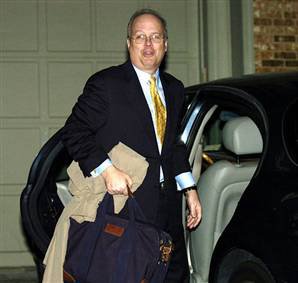Karl Rove: Last-Minute Evidence

Newsweek
Nov. 7, 2005 issue - Special counsel Patrick Fitzgerald's decision not to indict deputy White House chief of staff Karl Rove in the CIA leak case followed a flurry of last-minute negotiations between the prosecutor and Rove's defense lawyer, Robert Luskin. On Tuesday afternoon, Fitzgerald and the chief FBI agent on the case, Jack Eckenrode, visited the offices of the D.C. law firm where Luskin works to meet with the defense lawyer. Two sources close to Rove who asked not to be identified because the probe is ongoing said Luskin presented evidence that gave the prosecutor "pause." One small item was a July 11, 2003, e-mail Rove sent to former press aide Adam Levine saying Levine could come up to his office to discuss a personnel issue. The e-mail was at 11:17 a.m., minutes after Rove had gotten off the phone with Matt Cooper—the same conversation (in which White House critic Joe Wilson's wife's work for the CIA was discussed) that Rove originally failed to disclose to the grand jury. Levine, with whom Rove often discussed his talks with reporters, did immediately go up to see Rove. But as Levine told the FBI last week, Rove never said anything about Cooper. The Levine talk was arguably helpful to one of Luskin's arguments: that, as a senior White House official, Rove dealt with a wide range of matters and might not remember every conversation he has had with journalists. In any case, Fitzgerald made another visit early Friday morning—shortly before the grand jury voted to indict Dick Cheney's top aide, I. Lewis (Scooter) Libby—to the office of James Sharp, President George W. Bush's own lawyer in the case, to tell him the president's closest aide would not be charged. Rove remains in some jeopardy, but the consensus view of lawyers close to the case is that he has probably dodged the bullet.
Another lingering mystery: the role played by newspaper columnist Robert Novak and the original "senior administration official" who first leaked Valerie Plame's identity. Novak's July 14, 2003, column identifying Plame touched off the investigation in the first place. One lawyer involved in the case who declined to be identified because of the matter's confidentiality said Novak decided "early on" to cooperate with Fitzgerald's probe and ID his source—whom Fitzgerald never charged, apparently because the mystery leaker told the truth to the grand jury. It still is not clear if Novak testified before the grand jury or simply gave a statement. But the lawyer said Novak—and several other figures in the probe—may initially have been able to testify undetected because witnesses were allowed to take an underground elevator up to the grand jury, making it less likely they would be spotted by journalists. In the summer of 2004, presiding Judge Thomas Hogan ordered all witnesses to go through the front door. As a result, Rove—who made four grand-jury appearances—didn't get noticed testifying until October 2004. Novak declined to comment to NEWSWEEK.
—Michael Isikoff
© 2005 Newsweek, Inc.
Link Here




0 Comments:
Post a Comment
<< Home